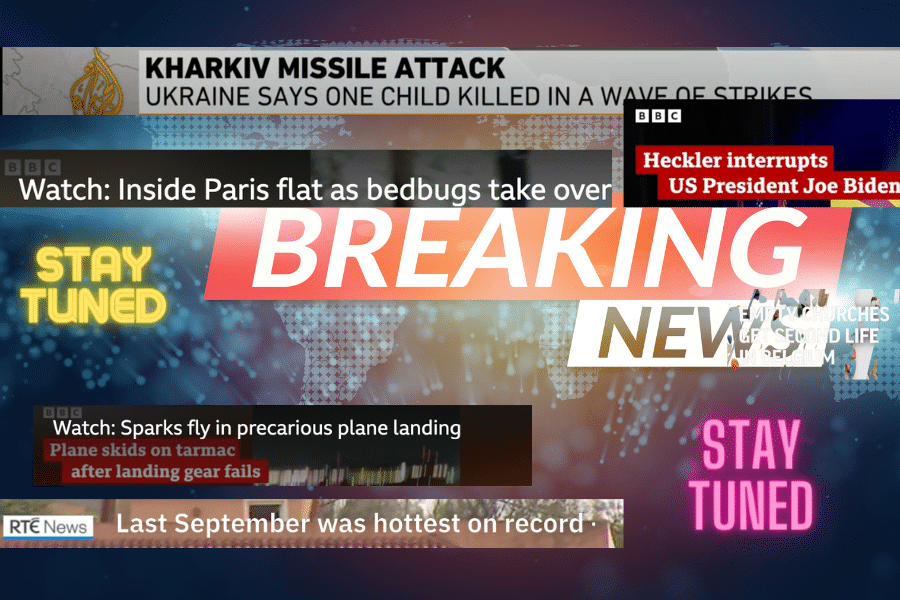
by Tom Heneghan | 11 Oct 2023 | Educators' Catalog, Journalism, Media Literacy
The 24/7 news cycle turns every news item into a headline without context. The more we consume the news the less we understand. Can we break out of that cycle? A TV screen fills with the words “Breaking News” while headlines scroll over. (Illustration by...
In this article, ND correspondent Tom Heneghan explains the tension between the immediate and the eventual in journalistic reporting. In this vein, what is “urgent incrementalism”? Help boost students’ media literacy skills with this text and accompanying classroom activity.
Exercise: Read the article and define “urgent incrementalism” as a class. Then, have students scan today’s headlines and each pick one story to read. Does their story lean “urgent” or “incremental”? How might that change the way a reader understands the issue at hand?

by Liana Hwang | 4 Oct 2023 | Educators' Catalog, Environment, Health and Wellness
To reduce your stress your doctor might prescribe a walk in the woods. Careful, though. This type of medicine is definitely addictive. A medicine cabinet includes a bottle that contains nature. Illustration by News Decoder. Photo on the medicine bottle of Comox Lake,...
In this text, ND correspondent and family physician Liana Hwang sheds light on the importance of spending time in nature as a way to promote positive mental and physical health. Plus, learn more about how spending time outdoors is an effective way to boost planetary health, too.
Exercise: Read the article with your class, then have students map out their schedule on a typical school day. How much time do they spend outdoors versus indoors? How can they intentionally carve out time to spend in nature? Have students set a SMART goal for increasing their time spent outdoors. SMART goals are Specific, Measurable, Achievable, Relevant and Time-Bound.
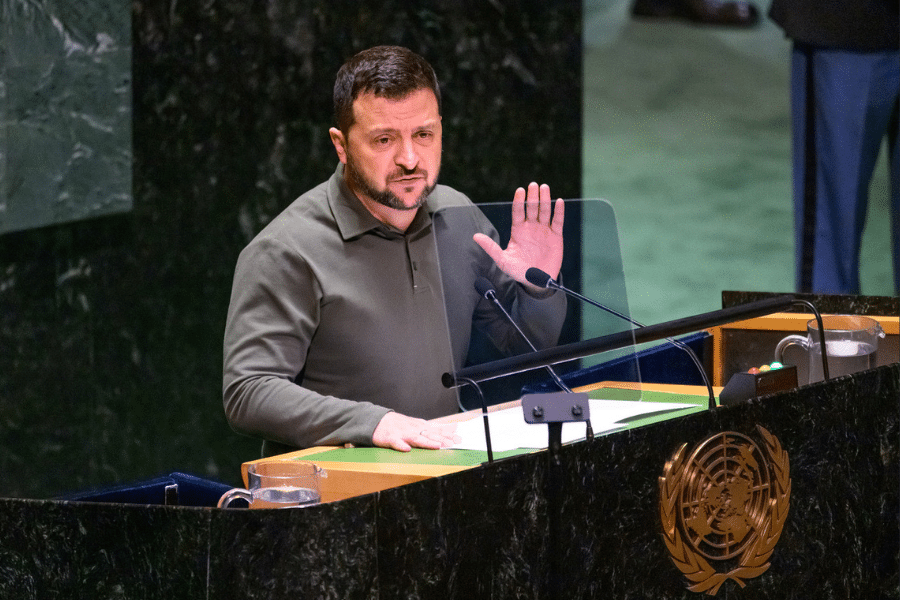
by Enrique Shore | 27 Sep 2023 | Educators' Catalog, Politics, Russia, Ukraine, World
Ukraine leader Volodymyr Zelensky criticized the UN for failing to stop Russia’s invasion. But to do more would mean changing how the United Nations works. Ukraine’s president Zelensky criticizes the United Nations for not doing enough to stop the war, during...
ND photojournalist Enrique Shore takes us to the 78th UN General Assembly in his piece covering Ukraine leader Volodymyr Zelensky’s speech condemning Russia’s invasion of his country. Is holding Russia accountable for its “unprovoked aggression” possible given the current United Nations structure?
Exercise: Read the article with your class, then have students analyze this political cartoon (symbolism, captions, dialogue, etc.). What parallels can students draw between the information in the article and the symbols in the political cartoon? How likely is reform of the current UN structure? Students can then create their own political cartoons depicting the structural tensions detailed in the article.

by Susanne Courtney | 22 Sep 2023 | Climate decoders, Decoders, Economy, Educators' Catalog, Environment, Politics, World
The small island nation of Barbados is leading the call for international finance reform needed to fight the impacts of global warming. The world is listening. From the left, Prime Minister of Barbados Mia Mottley, Netherlands’ Minister of Finance Sigrid Kaag,...
June to August 2023 were the world’s hottest months on record, meaning the stakes are high to address climate change for all. This is especially true for small island nations and developing countries who do little to contribute to climate change, but disproportionately suffer its consequences. Correspondent Susanne Courtney digs into Barbados Prime Minister Mia Mottley’s plan to level the climate financing playing field in this Decoder.
Exercise: Inequities in climate financing loom large. Read the article with students, then have them explore this interactive visualization of historical greenhouse gas emissions by country and region. How does your country or region’s emissions compare to those of the world’s largest emitters? Create an infographic depicting this information, including a call to action for students to promote climate action in their local communities.
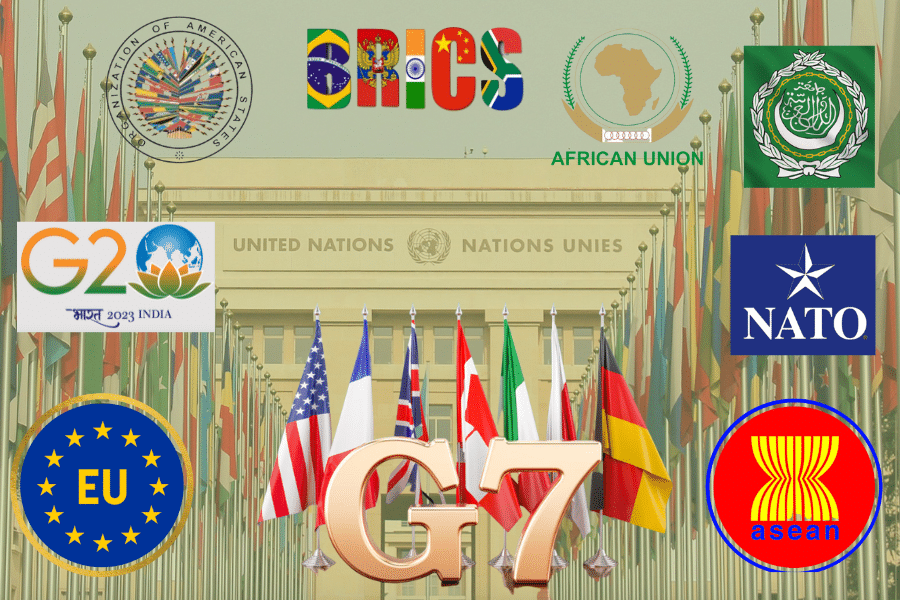
by Bernd Debusmann | 18 Sep 2023 | Decoders, Educators' Catalog, History, Politics, Ukraine, World
When Russia invaded Ukraine, the “international community” stood back. But is there such a thing? What, if anything, can bring the world together? The entrance to the United Nations in Geneva is obscured by the emblems of a dozen international economic and...
Blaming the “international community” for inaction is easy. But does this community actually exist, or is it just tantamount to the United States and company? Correspondent Bernd Debusmann runs it down in this Decoder.
Exercise: Divide students into nine groups. Each group will be assigned one of the regional organizations mentioned in the article: NATO, European Union, Arab League, G-7, G-20, ASEAN, OAS, African Union, BRICS. Groups should research their assigned organization and identify the organization’s main objectives and stance on current international tensions (e.g. war in Ukraine, economic sanctions on North Korea, nuclear proliferation, etc.). Can these regional groups work together to create a true international community, or are their interests too disparate?

by Helen Womack | 12 Sep 2023 | Education, Educators' Catalog, Journalism, Media Literacy, Russia
A blank page confronts every writer on deadline. Turning that empty space into an article someone might read takes more than simply hitting keys on a keyboard. Two images of a woman at a typewriter trying to find an idea. Photo illustration by News Decoder. This...
ND correspondent Helen Womack takes us through her process of going from a blank page to a published article in this piece on confronting writer’s block. How can we help students find their voice?
Exercise: Read the article with your class, then have students brainstorm pitches that they can submit to News Decoder. How might their initial ideas be transformed into a publishable piece? Consider: global/local relevance of pitches, at least two sources to interview to investigate the topic, students’ unique angle on the topic. Students should then submit a pitch for an opportunity to work with our editors to be published on our global news site.
For further tips on interviewing and drafting, direct students to our asynchronous E-Learning courses. If you’re not a member of our school network, contact us to learn more about these members-only resources.
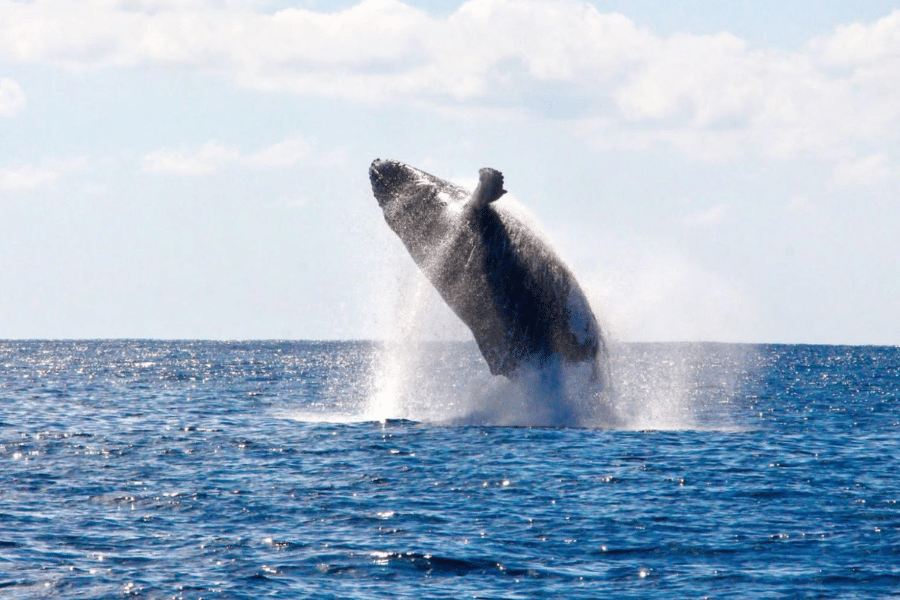
by Keya Dutt | 22 Aug 2023 | Contest winners, Educators' Catalog, School Year Abroad, Science, Student Posts, Youth Voices
Lots of people watch whales. But telling males and females apart and one whale from another takes special expertise. One researcher is using AI to do that. A whale leaps out of the water. Credit: Josianne Bouffard This article, by high school student Keya Dutt, was...
This piece, by youth correspondent Keya Dutt of News Decoder partner institution School Year Abroad, dives into the world of marine science and artificial intelligence. Through interviews with a veterinarian working with whales off the coast of Mozambique, the article discusses the implications of AI for experts trying to learn more about life under the sea.
Exercise: Artificial intelligence has varying effects on different groups of people. Help students adopt multiple perspectives by engaging in a “Circle of Viewpoints” activity after reading the article. In groups of five, students will each adopt a distinct persona to answer the following questions: Should artificial intelligence be allowed in secondary schools? What, if any, should be the limitations to using this tool? Personas may range from: student, school principal, parent/guardian, classroom teacher, AI developer in your local community. In each group, give students 10 minutes to independently brainstorm the pros and cons of using AI in the classroom, then 20-30 minutes to come to a consensus as a group. All groups should then share their final conclusions with the class and reflect on the process of adopting multiple perspectives.

by Jeremy Solomons | 17 Aug 2023 | Africa, Educators' Catalog, Health and Wellness, Personal Reflections, Religion
We carry complicated identities inside us. But others see only the outside and they carry their own biases. That can result in privilege or prejudice. A man holds a placard. Photo illustration by News Decoder. This article was produced exclusively for News Decoder’s...
The way we perceive others and ourselves shapes our lived experiences and may result in privilege or prejudice. In this article, correspondent Jeremy Solomons reflects on his own identity as a Jewish man who grew up in England with Lebanese and Persian heritage.
Exercise: Read the article with your class. Then, introduce the Big 8 Identities as a framework for understanding the complexities of identity. Independently, students should identify their Big 8, then discuss the implications of these identities in small groups of three or four. Which elements of your students’ “Big 8” may grant them privilege or subject them to prejudice? How might this change given various cultural contexts? Note: A level of trust and comfort is required for this activity to run effectively.
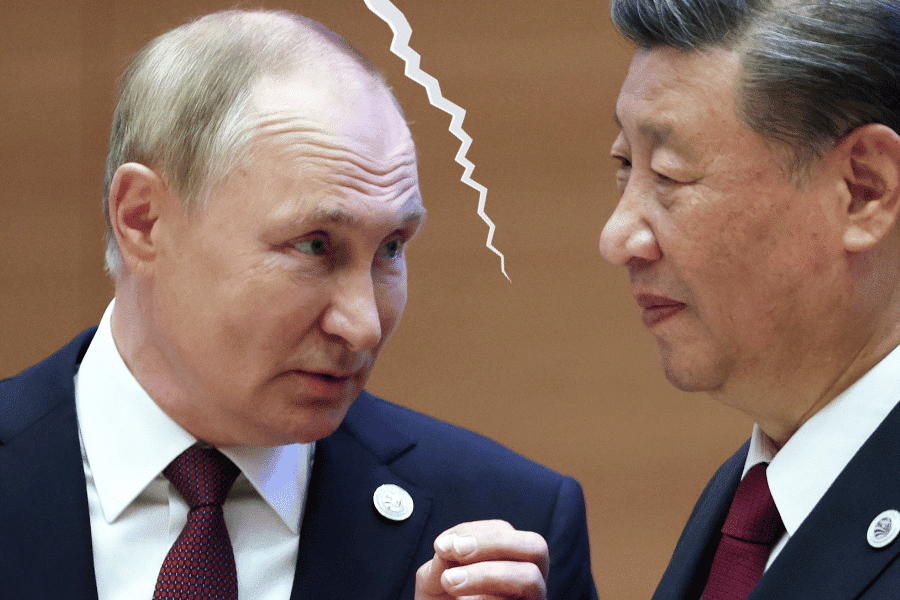
by Braden Holt | 15 Aug 2023 | Asia, China, Educators' Catalog, History, Politics, Russia, Ukraine
Western nations worry about the bond between Russia and China. But perhaps they should consider the possible consequences if this friendship breaks down. Russian President Vladimir Putin speaks to Chinese President Xi Jinping during a summit in Uzbekistan on 16...
The alliance between Russia and China is more fragile than their purported “friendship without limits”. What can history tell us about the Moscow-Beijing connection? And why does it matter? Decode the geopolitical context for your students in this article by Braden Holt of News Decoder partner institution Indiana University.
Exercise: After reading the article, students should select one paragraph that they feel best captures the central idea of the text. Then, they should pare this paragraph down to one sentence, then one phrase and one word. Through this process, students learn to discern and communicate the main idea of a complicated text, a skill they can use in all disciplines. Have students share their final word with classmates. Can the class come to a consensus for one word that best describes the text?
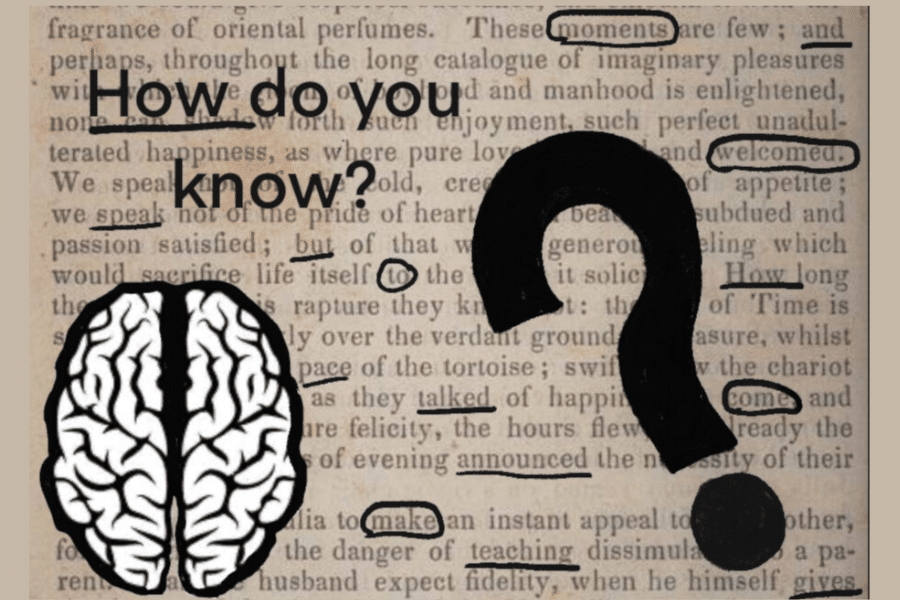
by Norma Hilton | 3 Aug 2023 | Educators' Catalog, Journalism, Media Literacy
Making sure that information is true isn’t easy. Our correspondent takes you through the arduous process of fact-checking a news story. Illustration by Ana Schwartz for News Decoder When I first started out in journalism as a 17-year-old, I had never heard of...
Correspondent Norma Hilton models the process of fact-checking in this important article for students and adults alike. In a world inundated with instantaneous information at our fingertips, knowing how to distinguish fact from fiction is ever-critical.
Exercise: After reading the article, have students dissect the fact-checking process modeled in the text. Prompt a class discussion on what the process looks like in practice, step-by-step. Did anything about the process surprise them? Then, in pairs, students should fact-check a short news text (either one they’ve selected or one you provide to them). Which sources should they examine to confirm that the text is credible?










